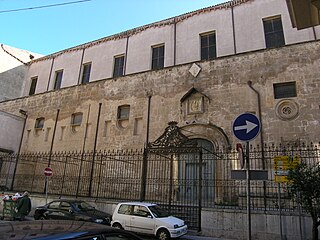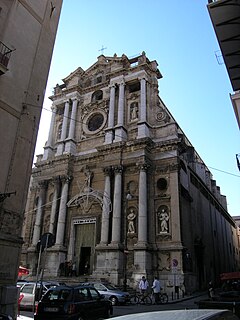
Palermo is a city in southern Italy, the capital of both the autonomous region of Sicily and the Metropolitan City of Palermo, the city's surrounding metropolitan province. The city is noted for its history, culture, architecture and gastronomy, playing an important role throughout much of its existence; it is over 2,700 years old. Palermo is in the northwest of the island of Sicily, by the Gulf of Palermo in the Tyrrhenian Sea.

Santa Maria delle Grazie is a church and Dominican convent in Milan, northern Italy, and a UNESCO World Heritage Site. The church contains the mural of The Last Supper by Leonardo da Vinci, which is in the refectory of the convent.

The Basilica of St. Mary of the Angels and of the Martyrs is a basilica and titular church in Rome, Italy, built inside the ruined frigidarium of the Roman Baths of Diocletian in the Piazza della Repubblica.

Santa Maria dei Miracoli and Santa Maria di Montesanto are two churches in Rome.

The Church of St. Mary of the Admiral, also called Martorana, is the seat of the Parish of San Nicolò dei Greci, overlooking the Piazza Bellini, next to the norman church of San Cataldo, and facing the Baroque church of Santa Caterina in Palermo, Sicily, southern Italy.

San Fili is a village and comune in the province of Cosenza in the Calabria region of southern Italy.

Canicattì is a town and comune (municipality) in the Province of Agrigento in the Italian region Sicily, located about 90 kilometres (56 mi) southeast of Palermo and about 34 kilometres (21 mi) east of Agrigento. In 2016, it had a population of 35,698.

Pietro Novelli was an Italian painter of the Baroque period, active mainly in Palermo. Also known as il Monrealese or Pietro "Malta" Novelli to distinguish him from his father, Pietro Antonio Novelli I. He was also nicknamed by contemporaries as the Raphael of Sicily.

The Spanish National Church of Santiago and Montserrat, known as Church of Holy Mary in Monserrat of the Spaniards is a Roman Catholic titulus church and National Church in Rome of Spain, dedicated to the Virgin of Montserrat. It is located in the Rione Regola, at the intersection of alleway of Via della Barchetta and the narrow Via di Monserrato, with the facade on the latter street, about three blocks northwest of the Palazzo Farnese.
Antonio del Duca or Lo Duca was the Sicilian friar whose persistent campaign for an official veneration of the "Seven Angelic Princes" was partly answered in the dedication of Santa Maria degli Angeli e dei Martiri, constructed to the orders of Pope Pius IV within the ruins of the Baths of Diocletian.

The Santa Maria Maddalena is a Roman Catholic church in Rome, named after Saint Mary Magdalene. It is located on the Via della Maddalena, one of the streets leading from the Piazza della Rotonda in the Campo Marzio area of historic Rome. It is the regional church for the people of Abruzzo.

San Giacomo in Augusta is a Baroque church in Rome, Italy. It was the church of the Hospital of San Giacomo degli Incurabili.

The Ospedale degli Incurabili or Complesso degli Incurabili is an ancient and prominent hospital complex located on Via Maria Longo in central Naples, Italy. Part of the complex, including the remarkable pharmacy, are now the Museo delle arti sanitarie of Naples.
Giacinto Platania was an Italian painter.

Giuseppe Velasquez, Velasques or Velasco was an Italian painter, active in a Neoclassic style.

Santa Maria della Gancia, also known as Santa Maria degli Angeli, is a 15th-century Roman Catholic church, adjacent to a convent, located on Via Alloro #27 in central Palermo, region of Sicily, Italy.
Arcangelo Placenza da Calatafimi was an Italian Franciscan Friar and Preacher: today he is venerated as Blessed by the Catholic Church.

Palermo, main city of Sicily, has a big heritage of churches which ranges from the Arab-Norman-Byzantine style to the Gothic and the Baroque styles. In particular, the list includes the most important churches of the historic centre divided by the four areas of Kalsa, Albergaria, Seralcadi and Loggia.

The Church of Saint Mary of Pity is a Baroque church of Palermo. It is located at the corner of Via Alloro and Via Torremuzza in the quarter of the Kalsa, within the historic centre of Palermo.

Santa Maria degli Agonizzanti, later called San Crispino is a small, now deconsecrated Baroque, Roman Catholic church or chapel located on Via Vittorio Emanuele II, corner with Via Pennisi, in Acireale in the region of Sicily, Italy.


















